
- Author:
- Liz Crouse
- Shawn Lee
- Date Added:
- 06/05/2020

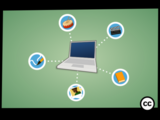

Explore this resource guide with links and handouts detailing inclusionary resources in an Early Learning setting.

This lesson plan can is geared for social studies, but can also be used in other content areas.
Trauma can result when a group of people are forced away from their schools, friends, businesses/work, neighborhoods/communities, then incarcerated without due process, under difficult conditions.
Students explore how historical and traumatic events such as Japanese American incarceration affect communities for the long term and how communities have worked to heal.
Note: This is not a ‘typical’ social studies lesson on Japanese American incarceration. It will involve working with material regarding trauma.
Activities 1 and 2 cover life skills and can be offered in the classroom at any time. (It may be ideal to teach this toward the beginning of the school year) Activity 3 is a foundational piece on what intergenerational trauma is. Activities 4, 5 and 6 go deeper into this topic.

The Washington State History Project is a multiyear initiative that originated in 2020 with the goal of transforming how Washington state history is taught. The project brought together educators, district facilitators, cultural consultants, and local experts to create six project-based learning (PBL) units that are anti-biased, interdisciplinary, place-based, and aligned to the Washington State Social Studies Learning Standards and the College, Career, and Civic Life (C3) Framework for Social Studies State Standards. The course weaves together original content, multimedia resources, primary sources, and curricular materials from Since Time Immemorial: Tribal Sovereignty in Washington State, developed by Washington Office of Superintendent of Public Instruction (OSPI).
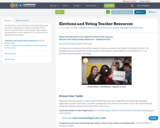
It is important to educate future voters about the issues, processes, and impacts of voting in elections. These resources include links to lesson plans, videos, games, and printables to assist teachers K—12 to promote civic participation and voting.

It is important to educate future voters about the issues, processes, and impacts of voting in elections. These resources include links to lesson plans, videos, games, and printables to assist teachers K—12 to promote civic participation and voting.

In this task from ClimeTime educators, students will demonstrate understanding of natural resources and their uses with respect to their impact on the Earth. Students will do short explanations, drawing an image, and providing evidence to support an argument.
Resource includes a student task document, teacher guide, and task facilitation slides.
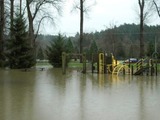
This task, by ClimeTime educators, is for 4th grade students. After class brainstorm of the causes and effects of flooding on a playground or in a local context, students will generate solutions to the problems related to the flooding. Students will select two solutions to describe how the solutions could be implemented and what factors affect the success of the solutions. Students will describe which of the two solutions they think is best and the reasons for their decision.
The resource includes a student task document, teacher guide, and task facilitation slides.

This task, from ClimeTime educators, is for late-elementary (3-5) students, especially while studying about the needs of plants. Students use a simulation to test different variables and explore how different plants have different needs. Then, students connect what they saw in the simulation to plants in their area.
The resource includes a student task document, teacher guide, and task facilitation slides.

Collecting weather data across time supports data collection and analysis practices. Students can use their own data to look for patterns across time. Engaging in this assessment activity, developed by ClimeTime educators, will help students: explain the components that constitute weather and explain that these components change in patterns; describe how various components of weather can be different at different times of the year; explain how changes in the various elements of weather create patterns and influence behavior.
Resource includes a student task document, teacher guide, and task facilitation slides.

This task developed by educators in the ClimeTime project, is for third grade students to explore weather data and make predictions about the nature of weather in different seasons based on historical data patterns. Scale is also explored as students are asked to explain the difference between weather and climate so some understanding that climate is weather data collected over time, averaged over decades is needed.
Includes a student task document, teacher guide, and task facilitation slides.
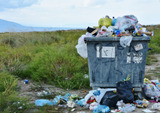
This task, by ClimeTime educators, is for 5th grade students. After class discussions about trash, litter, and available programs for recycling and composting, students collect trash and sort it into “recycling,” “food waste/compostable,” and “landfill.” Students learn about littering behaviors. Students incorporate what they have learned to develop an argument using claim, evidence, reasoning.
Resource includes a student task document, teacher guide, and task facilitation slides.
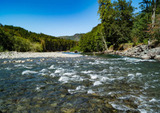
This task, by ClimeTime educators, is for 4th grade students. After class discussions about how dams affect rivers, students analyze aerial photographs of the Elwha River taken just before and at intervals after the removal of the Elwha Dam. Students incorporate what they have learned about erosion to explain the phenomenon of change in the turbidity of the water and structure of the beach at the mouth of the river.
Resource includes a student task document, teacher guide, and task facilitation slides.
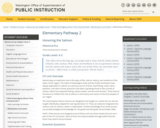
Salmon play an important role in the ways of life, culture, history, and resilience of the tribes of this region. The tribes of Washington State and the Pacific Northwest have always depended on salmon as a primary source of food. Overfishing, roads, dams, pollution, and other human practices have been a growing threat to the survival of salmon, which has impacted fishing, salmon-eaters, and the environment. These lessons introduce to children the role of salmon in the history and culture of the first peoples of our region.
The Honoring the Salmon lessons are designed to be taught as a series but can also be taught individually, adapted for each grade level, K-3. They can easily be integrated into science units on salmon, water or watersheds. Content knowledge from these lessons can provide background knowledge for 3rd grade and 4th grade Social Studies CBAs.
NOTE: These lessons are designed around fiction and non-fiction books that are not a part of the STI curriculum. Most of them are easily available through public libraries. Some may need to be purchased.
These lesson resources align to additional Washington State Social Studies, English Language Arts, Environmental and Sustainability, and Social Emotional Learning standards. A full standard curriculum document is included at the bottom of the Pathway 2 introduction page.

At OSPI, part of our mission is to prepare students for civic engagement throughout their lives. We believe our schools must engage and empower students, from an early age, with opportunities to participate in civil conversations, examples of effective civic engagement, and tools to find peaceful solutions to community problems.OSPI’s Social Studies and Social-Emotional Learning teams have put together resources for educators, families, and students to help with these difficult conversations.

These are full-course openly licensed resources for districts interested in exploring OER options when considering core instructional materials for district adoption. Course materials are available for online viewing or download.

These short films by Stourwater Pictures are accompanied by activities for classroom and remote teaching and learning about the story of Japanese American WWII exclusion and incarceration on Bainbridge Island and Washington State.
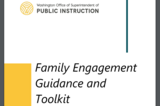
The Family Engagement Guidance and Toolkit was developed to support districts, schools, and classrooms with planning for implementation of positive family engagement and participation practices. Each section begins with guided questions that were compiled from considerations and concerns raised by workgroup members.
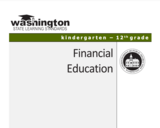
Washington’s Basic Education Act requires that school districts provide opportunities for every student to “understand the importance of work and finance and how performance, effort, and decisions directly affect future career and educational opportunities.”
Financial education attends to the development of short-term and long-term skills and competencies for academic and personal growth. Financial education supports students’ academic performance in several subject areas and plays a major role in preparing students for college, career, and a life of financial stability and well-being